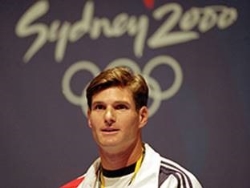I've known a lot of athletes who qualified for the Olympic Games despite injuries. But I know of only one who qualified because of an injury.
Cliff Meidl's story captures the spirit of the Olympics. And it shows how the values of those events at their best can help us become better sports physicians. Although our technical skills count for a lot, we can only facilitate our patients' healing. They must do the hardest part of the work themselves.

In November 1986, Cliff, a 20-year-old plumber's apprentice, hit three buried high-voltage electrical cables with a jackhammer.[1] An estimated 30,000 volts surged through his body, exploding bone and cartilage from the inside all the way up to his head. To put that into perspective, electric chairs use only 1500-2000 volts for executions. So it's safe to say that Cliff should have died.
And he nearly did. His heart stopped. Paramedics were able to get it going again, but they had to resuscitate him on the way to the hospital.
One year out of fellowship, I was an attending physician at the University of California Medical Center in Los Angeles when Cliff arrived there. I had spent years preparing to treat the worst imaginable traumas, but Cliff's injuries were unimaginable. Burns covered over 15% of his body. One shoulder blade had burst. He needed flaps and skin grafts. But worst of all, more than one third of each leg had disintegrated.
As part of a team with renowned plastic surgeon Malcolm Lesavoy, MD, and others, I got to work reconstructing Cliff's legs. We brought to the job all the skill we could muster in 17 procedures. Our best hope was to avoid amputation.
But very quickly, we noticed something else going on—something that had nothing to do with our expertise. Through every step of his painful rehabilitation, Cliff grew more and more determined. He never complained. He just asked, "What's next?" Continue Reading
Before he had even finished the rehabilitation, Cliff started paddling various watercrafts. The days spent on crutches had already strengthened his upper body, and he took naturally to the sport. The same year in which he was injured, he began competing in canoe and kayak events, and in 1996 he qualified for the Olympics—not the Paralympic Games, the Olympic Games.
Four years later, in Sydney, Australia, I was overseeing the sports medicine team at the Olympic soccer tournament. I was sitting in the stands during the opening ceremonies when Cliff walked into the Olympic Stadium carrying the Stars and Stripes.
It's a long-standing tradition for delegations of athletes to select one among their number to bear the flag, and the choice often symbolizes some extraordinary accomplishment. I had no idea that Cliff would be selected. So when he strode into the stadium with a normal gait, I nearly broke down.
Moments like that reinforce what I have always believed: that sport can bring out the best in us all.
The Olympic Games began as part of a religious festival at the sanctuary of Zeus in Olympia, Greece, around 776 BC.[2] Over the next 600 years, the games occupied a prime position in the spiritual life of ancient Greece, even as its culture evolved.
The sacred nature of the games also infused the modern Olympic movement, which revived the games as an international celebration in 1896.[3] At their best, the games are devoted to celebrating the human capacity to improve body, mind, and soul.
They are about taking part—not necessarily about winning. Cliff's peers in the US delegation of 2000 recognized that when they elected him to bear the nation's colors.[4] He never won a medal at the games, but the spirit with which he overcame adversity inspired all of them.
These values connect people from North Korea, to people from Burkina Faso, to people from the United States. And as sports physicians, we can harness that spirit to help our patients.
I tell my patients, "You have a choice. You can come back better than you were, like Cliff Meidl. Or you can let your injury depress you. You can withdraw and regress."
The Olympic motto—faster, higher, stronger—can help our patients realize that the real victory is the "win within."[5] The Win Within: Capturing Your Victorious Spirit (Greenleaf, 2014) is the name of the book I wrote to show people that coming back from adversity is part of our heritage—that we as human beings are more adapted to adversity than we are to success.
Adversity is the engine of unimagined opportunity. It can unleash our energy and stimulate our will. It moves us to succeed. If I don't have food, I have to go get some. If I'm cold, I have to build a shelter. When we have too much food, too much wealth, and too much pleasure, we get weak, fat, and sickly.
I remind patients who don't participate in sports that they have the heritage of athletes. We all have the genes of pursuit-hunters who survived by running down their prey and running away from their predators. That's why even now, in 2016, when we go out and take a run, we feel good. We get an endorphin surge and our lipids go down. Our hearts and brains become clear.
The life of sport and sport of life are interlinked. Exercise is our birthright; it's our legacy; it's why we are here.
We no longer have to fear saber-toothed tigers or cave bears. But when you look today at how people can be successful in 2016, it's by avoiding the predators in our urban life: overeating, inactivity, and smoking. And it's by rising to meet adversity.
I'll be thinking about that next month when I sit in the Olympic Stadium in Rio de Janeiro and watch the opening ceremonies once again.
